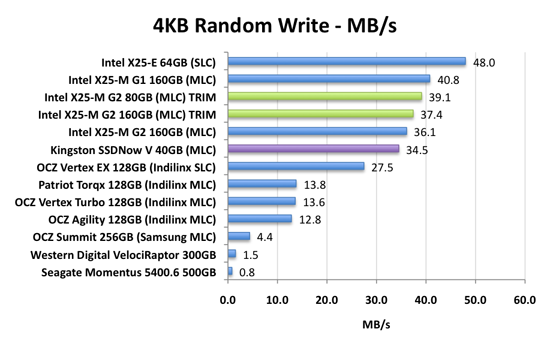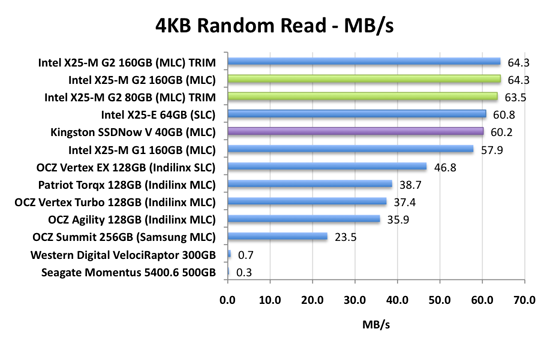The SSD Improv: Intel & Indilinx get TRIM, Kingston Brings Intel Down to $115
by Anand Lal Shimpi on November 17, 2009 7:00 PM EST- Posted in
- Storage
Random Read/Write Speed
This test writes 4KB in a completely random pattern over an 8GB space of the drive to simulate the sort of random writes that you'd see on an OS drive (even this is more stressful than a normal desktop user would see). I perform three concurrent IOs and run the test for 3 minutes. The results reported are in average MB/s over the entire time:

Random write speed looks to be a bit better with the new firmware. The 80GB G2 being a little faster than the 160GB version for some reason. With enough free space, the Kingston SSDNow V performs similarly to a non-TRIM enabled X25-M G2.











162 Comments
View All Comments
Pandamonium - Monday, October 26, 2009 - link
The 2nd gen X18-M isn't available as far as I can tell. It kind of shafts us tablet and ultraportable users out of the SSD market for another round =/Cavicchi - Monday, October 26, 2009 - link
"You no longer have to boot to DOS and secure erase your SSD before installing Windows, just quick format the partition before installing Windows 7."I always thought the "quick format" doesn't wipe the entire drive as clean as a full/long format. Does the above mean we only need to do a quick format to wipe a drive clean to install Windows 7?
Also, I noticed Superfetch, Prefetch, and Ready Boost are enabled in Windows 7 x64 with my X25-M G2 160GB drive installed.
Voo - Monday, October 26, 2009 - link
Logically when a TRIM command is sent to the drive you lose all the data that was saved there.So, there's no difference between full/quick format or anything else as long as it triggers the TRIM command..
Beno - Monday, October 26, 2009 - link
"SSDs are made up of millions of NAND flash cells. They can be written to in groups called pages (generally 4KB in size) but can only be erased in larger groups called blocks (generally 128 pages or 512KB). These stipulations are partially the source of many SSD performance issues."but isnt it possible to erase data in 4KB, the same way they are written?
krumme - Monday, October 26, 2009 - link
Where does speed matter most?Getting some sense into the g2 hype
Now you can have a job with a Dell and a hd with samsung controller without quitting the job
Thanx Anand for always improving your site and letting us learn
Thats whats move this boys-toy business forward
flynace - Monday, October 26, 2009 - link
If you set up a software RAID-0 array within Windows 7 will it support TRIM?Or is TRIM not possible on any form of RAID (OS, BIOS, HW, etc.)?
And does aliging the partitions make any difference on these drives?
Voo - Monday, October 26, 2009 - link
Iirc Anand stated in some of his articles that there's no TRIM support for raid, because the controller had to forward the commands.But imho it sounds not like a unconquerable problem, so it's probably only a question of time.
flynace - Tuesday, October 27, 2009 - link
Thanks. I assume Intel will update their drivers to support RAID TRIM eventually, but if you don't have an 'R' tybe Intel ICH, does Win7 support TRIM if you set up a software RAID array in the OS still using the MS AHCI drivers?Willardjuice - Monday, October 26, 2009 - link
Did Intel update their Windows 7 sata/raid drivers to also include TRIM support? Or do we have to use the drivers provided by Microsoft?DoveOfTheSouth - Monday, October 26, 2009 - link
Another great SSD article from Anand (thank you so much)!But I'm really disappointed that you have to use the Microsoft Win 7 disk driver to get TRIM. It has a huge problem.
Based on my experience, I would normally strongly recommend that the first thing you do when installing Win 7 is replace the Microsoft driver with the latest Intel Matrix Storage Manager.
The following link describes the problem (long periods of system non-responsiveness) you can get with the Microsoft driver and at least some PCs, and how to fix it:
http://blogs.zdnet.com/Bott/?p=1431&page=3&...">http://blogs.zdnet.com/Bott/?p=1431&page=3&...
I had exactly the same crippling problem on a Dell Dimension 9100 which baffled me until I replaced the Microsoft driver with IMSM - problem disappeared instantly.
Okay it was bit of an old PC but of the 3 I have been testing with Win 7 for the last couple of months, it was the only one that used the Microsoft driver instead of IMSM (it was an XP upgrade ie OS reinstall, the others upgrades from Vista). So I don't know how widespread the problem with the Microsoft driver is, it hit my only PC that was a candidate, but I'd be pretty wary.
Otherwise Win 7 has been great.
So it looks like you have a choice: IMSM with no TRIM or a buggy Microsoft driver with TRIM.